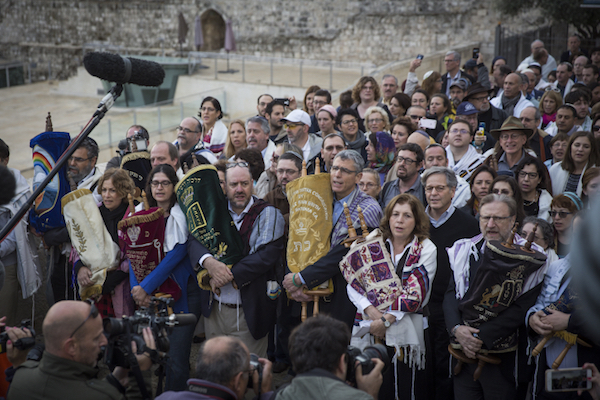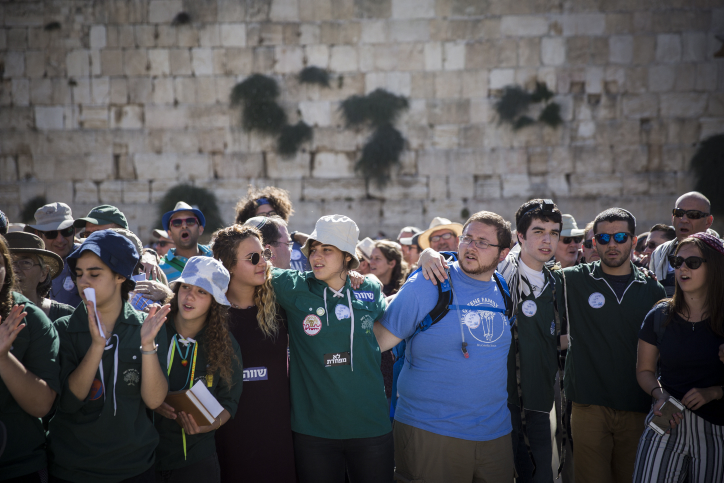Those who dismiss the struggle at the Western Wall because it ignores Palestinians should recognize how important the Kotel is to American Jews. Their struggle for justice might start at the Western Wall, but it doesn’t necessarily end there.
By Rachel Canar

Something unprecedented happened in Jerusalem on Wednesday. More than 200 people, including 12 rabbis — leaders of the Reform, Conservative and Masorti movements — held a major Jewish protest against the status quo in Israel.
It wasn’t about the occupation; it was about the rights of Jews of all streams to pray in their respective traditions at the Western Wall, a right that has been actively denied them for decades. Some Jewish and Israeli activists, who for years have been waiting for the Diaspora leadership to march on the barricades of the occupation, were frustrated to see that energy focused on something as seemingly unimportant as the Western Wall.
It seems that many Israelis, especially those who are not religiously affiliated or inclined, do not understand how important the Western Wall (“Kotel” in Hebrew) is to Diaspora Jewry. They seem to be especially blind to the anger roused by the Israeli government reneging on an agreement to create an egalitarian prayer space at the wall.
Diaspora Jewry’s connection to Israel is physically centered at the Kotel. The entire country is supposed to be a homeland for the Jewish people, but when Diaspora Jews visit, Israel invariably feels foreign. It is only at the Western Wall that they say, “aha!”, this is my connection. “My ancestors laid their hands here, or dreamed of it, just as their ancestors did.” When you lay your hands on the stones, you can almost feel a buzzing and hear whispers of millions of prayers. This is where we can see and feel that we are all one people that come from this place.
UNESCO notwithstanding, there is no question that these stones are the last remnants of the wall that once framed the Second Temple, the center of the civilization of a scrappy band of tribes known as The Hebrews.
Anyone who has a vested interest in Diaspora Jews taking action on or engaging with Israel, even in order to oppose the occupation, must first and foremost recognize that reality. It is not mere symbolism: either this is their homeland or it isn’t, and the Kotel is the most tangible space that makes it theirs. You can argue whether this should be true or not, and whether it is wrong or right. But it is what it is.

The significance of the Kotel cannot be understated — not for Jewish Israelis, certainly not for Diaspora Jewry. Yet the Israeli government on Wednesday continued to dismiss the Diaspora’s connection to and rights at the Kotel, instructing police to block their path and allowing them to be roughed up by young ultra-Orthodox men, some of whom work for the authorities who run the Kotel. The prime minister called the protest a “unilateral violation of the status quo.”
Challenge the status quo is exactly what they set out to do. The Kotel is no longer merely a symbol of the Jewish people’s historic ties to this physical space. For many it has also become a symbol of how a minority group of religious extremists has hijacked the Jewish character of the State of Israel, imposing values antithetical to those of a democratic nation-state, and the plurality of modern Jewry. The Rabbi of the Wall, to whom the state has given a monopoly on running the site, has turned what was once a sacred space that belonged to all Jews into an ultra-Orthodox synagogue, segregating, excluding and silencing women.
So it should come as no surprise that the experience of intolerance at the Kotel has been a turning point for the way many Diaspora Jews experience and relate to Israel. “I had never felt so alienated, so humiliated for being a Reform Jew,” Melanie Robbins, a Jewish American woman who moved to Israel to work for an Israeli-Palestinian organization and a prominent pro-peace group, told me about her last visit at the Kotel. “We were unwanted in what should’ve been a spiritual home, a physical home. I lost a lot of determination that day, determination that I have yet to regain.”
Time and again we hear from family, colleagues and Diaspora Jewish communal leadership that the Diaspora relationship has become harder to maintain as Israel drifts further away from once shared values of democracy, gender equality, tolerance, and humanism.
That is the real reason Women of the Wall is so popular among Diaspora Jews — not just because some of them pray in a similar fashion, but because they understand these women should have the right to do so. It is in this context, we should understand the words of Rabbi Rick Jacobs at the Kotel on Wednesday, the head of the Union of Reform Judaism representing more than 2 million people: “We will change this place, we will change this country, and make this a home for all Jewish people.”
Israel’s recognition of only the most fundamentalist version of Judaism is at the heart of what is wrong with so much of this country today: it emboldens a core philosophy that allows for the occupation of another people, and an entire gamut of civil and human rights infractions. Modern Judaism does not conflict with democracy, but when policy is dictated by a state-sponsored ultra-Orthodox monopoly over religious authority, such conflicts are almost guaranteed.
Arms locked together and tightly grasping 14 Torah scrolls, hundreds of Israelis and Diaspora Jews broke through police barricades at the Kotel on Wednesday. Women of the Wall held their monthly service and read from the Torah, and hundreds participated in an egalitarian service in the plaza. It was the North American Jewish community’s way of saying: we’ve been waiting patiently while you insult us and treat our Israeli counterparts with demi-status. We’ve agreed to compromises and endless discussions. We won’t wait anymore. We will make Israel more pluralist, tolerant and egalitarian because it must be if it wants to be a homeland for the entire Jewish people, a people that includes a whole lot of Jews who care about justice.
Once they set out to effect change, I can’t imagine it will stop at the Kotel.
Rachel Canar is the development director of Israel Hofsheet, and the director of NGO Catalyst.

